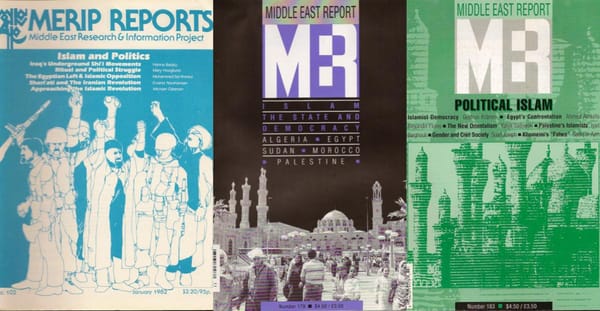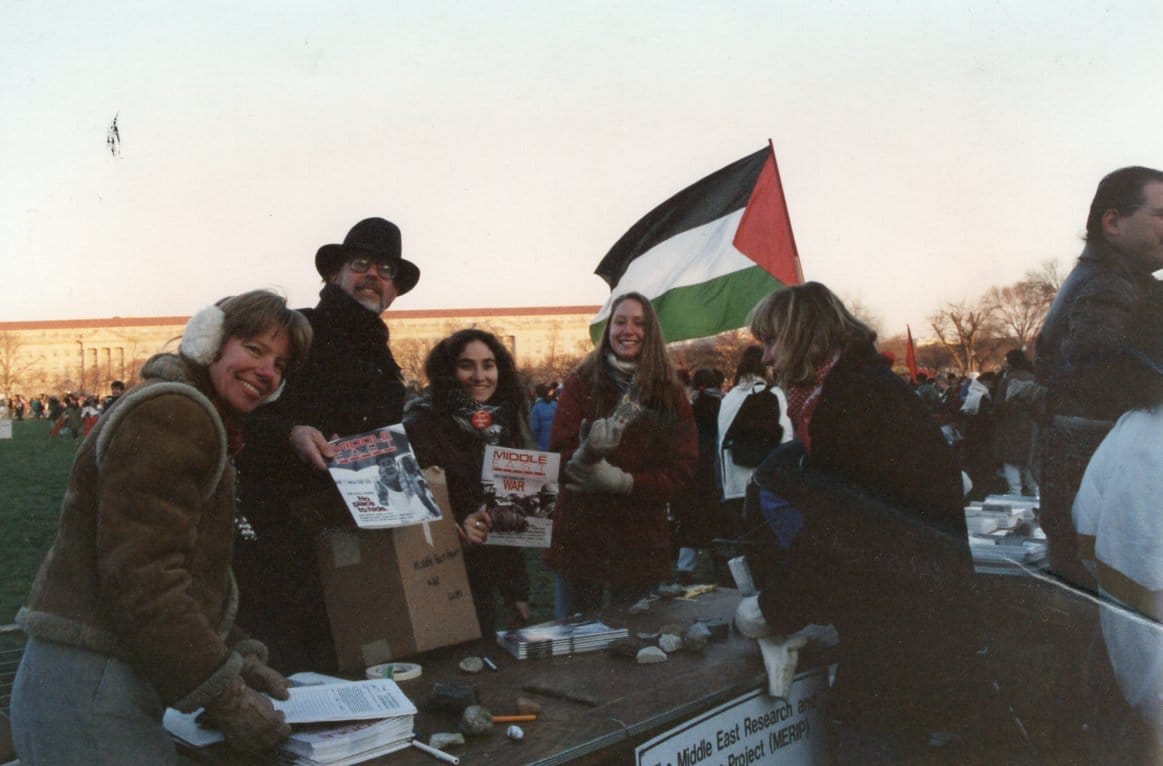Joe Stork and MERIP
In light of his passing, a guide to MERIP founder, Joe Stork's contributions to the publication.



Since the news of Joe Stork’s passing on October 22, I have been in touch with many long-time MERIP contributors, editors and close friends and comrades of Joe and of our organization. In the spirit of remembering his massive contributions to the publication and beyond, we’ve compiled a brief guide to his writing and to his broader analysis. Throughout, his commitment to a just future for Palestine and the region is evident. I thank those who helped assemble the list below—especially Lisa Hajjar, Waleed Hazbun, Ted Swedenburg, Esther Merves and Mouin Rabbani. We will have further reflection and remembrances to share in our pages and over our newsletter in the new year and hope this short guide is enlightening in the meantime.
-James Ryan, MERIP Executive Director
2…3…Many, Winter 1970
A year before Joe Stork established MERIP, and not long after returning from the peace corps in Turkey, he spent several weeks visiting Palestinian refugee camps in Jordan. As fate would have it, Joe was observing Fatah activities in the Wahdat camp as the Jordanian Army opened fire on Palestinian refugees and commandos, triggering a series of US-supported Jordanian assaults on PLO positions across Jordan now known as “Black September.” Joe’s report from this time is noteworthy not only as a historical account of the events but for his crystal clear analysis of the state of the Palestinian struggle, its internationalist character and its deeply-rooted anti-imperialism.
—
Issue 100, October-December 1981
After returning from Jordan, Joe Stork met with six fellow anti-war activists and peace corps veterans in a cabin in New Hampshire to discuss their recent experience in the Middle East and what they could do to further the cause of anti-imperialism in the region. This meeting became MERIP’s founding moment, which is recounted in this essay by Joe and co-founder Peter Johnson for the 100th Issue of Middle East Report. It details not only the organization’s growth but the continued broadening of the struggle to include the entrenchment of conservatism in the Arab regimes and the fate of Iran after the revolution.
—
Middle East Oil and the Energy Crisis
Monthly Review Press, 1975
Growing out of his work with MERIP, Joe Stork published an in-depth analysis of the Energy Crisis in 1975 with the Monthly Review Press. This book remained an influential overview of the political dynamics of oil in the region, a topic Joe would return to often in the pages of MERIP.
—
Issue 120, January-February 1984
Reflecting on the decade following the Yom Kippur War of 1973, Joe Stork overviewed politics in the region for MERIP’s winter issue. This piece provides a comprehensive, if brief, analysis of the alignment of conservative and reactionary forces in the region during a decade that saw the assassinations of Anwar Sadat in Egypt and King Faysal in Saudi Arabia, the outbreak of war between Iran and Iraq and the invasion of Lebanon by Israel. It was in many ways a point of desperation for the causes MERIP stood for, as Joe wrote, “In many respects, the contrasting spectacles of October 1973 and the summer of 1982 delimit an era where the regimes survived but the Arab nationalist ethos, and the allegiance it provided both to states and oppositions, disintegrated.”
—
Constructing an International Criminal Court
Issue 207, Summer 1998
After formally leaving his post as Editor in 1995, Joe Stork became particularly interested in the development of international legal institutions such as the ICC and the defense of human rights through his work at Human Rights Watch and the Gulf Centre For Human Rights. He continued to stay in touch with and contribute to MERIP in these years, and this report on the developments that would lead to the Rome Statute in 1998 clearly delineates how internationalist commitments were and weren’t reflected in the negotiations and, ultimately, in the treaty itself.
—
Reflections on MERIP’s First 25 Years
MERIP’s Place in the Political and Media Landscape
Issue 300, Fall 2021
Our 50th anniversary issue featured Joe Stork’s reflections on the first 25 years of MERIP and an interview conducted by Lisa Hajjar with Joe and Chris Toensing, Joe’s successor as Editor. Across these two pieces, one gets a palpable sense of the history of our organization and the challenges posed by the waxing and waning of interest in the region across the media landscape.
—
MERIP’s Impact On Middle East Studies: Showcasing a MESA Roundtable
Review of Middle East Studies, Volume 55 No. 2, 2022
To mark MERIP’s 50th anniversary Joe Stork was gathered into a group for a MESA roundtable with current and former editorial committee members—Waleed Hazbun, Zachary Lockman, Ted Swedenburg, Judith Tucker, Stacey Philbrick Yadav, Jacob Mundy and Norma Claire Moruzzi—to discuss the legacy of MERIP after 50 years. It’s an insightful conversation on the role of MERIP vis-à-vis the academy and reflective of how far we have come as an institutional space for the discussion of struggles that might otherwise not find a purchase in academic spaces.
—
The Best American Poetry Blog, July 11, 2009
Ted Swedenburg has reminded us that no remembrance of Joe Stork would be complete without mention of his musical side. Joe was a talented folk musician, and at the same time he established MERIP, he formed a well-regarded folk band, The Fast Flying Vestibule, a short history of which is given in this blog post. The post also has recordings of several of their songs, including Joe’s lead vocal on “I’m Glad I’m Prepared for the Recession.”
—
Thank you, Joe.








